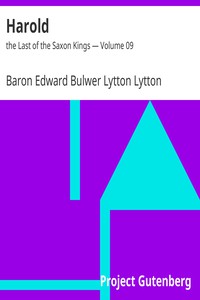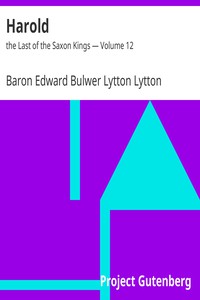Harold : the Last of the Saxon Kings — Complete, Lytton [best e reader for academics .txt] 📗

- Author: Lytton
Book online «Harold : the Last of the Saxon Kings — Complete, Lytton [best e reader for academics .txt] 📗». Author Lytton
Haco bowed his head, and went.
In a few moments more, Gurth came in. To this pure and spotless spirit Harold had already related the events of his unhappy visit to the Norman; and he felt, as the young chief pressed his hand, and looked on him with his clear and loving eyes, as if Honour made palpable stood by his side.
Six of the ecclesiastics, most eminent for Church learning,—small as was that which they could boast, compared with the scholars of Normandy and the Papal States, but at least more intelligent and more free from mere formal monasticism than most of their Saxon contemporaries,—and six of the chiefs most renowned for experience in war or council, selected under the sagacious promptings of Alred, accompanied that prelate to the presence of the Earl.
“Close, thou! close! close! Gurth,” whispered Harold “for this is a confession against man’s pride, and sorely doth it shame;—so that I would have thy bold sinless heart beating near to mine.”
Then, leaning his arm upon his brother’s shoulder, and in a voice, the first tones of which, as betraying earnest emotion, irresistibly chained and affected his noble audience, Harold began his tale.
Various were the emotions, though all more akin to terror than repugnance, with which the listeners heard the Earl’s plain and candid recital.
Among the lay-chiefs the impression made by the compelled oath was comparatively slight: for it was the worst vice of the Saxon laws, to entangle all charges, from the smallest to the greatest, in a reckless multiplicity of oaths 215, to the grievous loosening of the bonds of truth: and oaths then had become almost as much mere matter of legal form, as certain oaths—bad relic of those times!—still existing in our parliamentary and collegiate proceedings, are deemed by men, not otherwise dishonourable, even now. And to no kind of oath was more latitude given than to such as related to fealty to a chief: for these, in the constant rebellions which happened year after year, were openly violated, and without reproach. Not a sub-king in Wales who harried the border, not an earl who raised banner against the Basileus of Britain, but infringed his oath to be good man and true to the lord paramount; and even William the Norman himself never found his oath of fealty stand in the way, whenever he deemed it right and expedient to take arms against his suzerain of France.
On the churchmen the impression was stronger and more serious: not that made by the oath itself, but by the relics on which the hand had been laid. They looked at each other, doubtful and appalled, when the Earl ceased his tale; while only among the laymen circled a murmur of mingled wrath at William’s bold design on their native land, and of scorn at the thought that an oath, surprised and compelled, should be made the instrument of treason to a whole people.
“Thus,” said Harold, after a pause, “thus have I made clear to you my conscience, and revealed to you the only obstacle between your offers and my choice. From the keeping of an oath so extorted, and so deadly to England, this venerable prelate and mine own soul have freed me. Whether as king or as subject, I shall alike revere the living and their long posterity more than the dead men’s bones, and, with sword and with battle-axe, hew out against the invader my best atonement for the lip’s weakness and the heart’s desertion. But whether, knowing what hath passed, ye may not deem it safer for the land to elect another king,—this it is which, free and fore-thoughtful of every chance, ye should now decide.”
With these words he stepped from the dais, and retired into the oratory that adjoined the chamber, followed by Gurth. The eyes of the priests then turned to Alred, and to them the prelate spoke as he had done before to Harold;—he distinguished between the oath and its fulfilment—between the lesser sin and the greater—the one which the Church could absolve—the one which no Church had the right to exact, and which, if fulfilled, no penance could expiate. He owned frankly, nevertheless, that it was the difficulties so created, that had made him incline to the Atheling;—but, convinced of that prince’s incapacity, even in the most ordinary times, to rule England, he shrank yet more from such a choice, when the swords of the Norman were already sharpening for contest. Finally he said, “If a man as fit to defend us as Harold can be found, let us prefer him: if not——”
“There is no other man!” cried the thegns with one voice. “And,” said a wise old chief, “had Harold sought to play a trick to secure the throne, he could not have devised one more sure than the tale he hath now told us. What! just when we are most assured that the doughtiest and deadliest foe that our land can brave, waits but for Edward’s death to enforce on us a stranger’s yoke—what! shall we for that very reason deprive ourselves of the only man able to resist him? Harold hath taken an oath! God wot, who among us have not taken some oath at law for which they have deemed it meet afterwards to do a penance, or endow a convent? The wisest means to strengthen Harold against that oath, is to show the moral impossibility of fulfilling it, by placing him on the throne. The best proof we can give to this insolent Norman that England is not for prince to leave, or subject to barter, is to choose solemnly in our Witan the very chief whom his frauds prove to us that he fears the most. Why, William would laugh in his own sleeve to summon a king to descend from his throne to do him the homage which that king, in the different capacity of subject, had (we will grant, even willingly) promised to render.”
This speech spoke all the thoughts of the laymen, and, with Alred’s previous remarks, reassured all the ecclesiastics. They were easily induced to believe that the usual Church penances, and ample Church gifts, would suffice for the insult offered to the relics: and,—if they in so grave a case outstripped, in absolution, an authority amply sufficing for all ordinary matters,—Harold, as king, might easily gain from the Pope himself that full pardon and shrift, which as mere earl, against the Prince of the Normans, he would fail of obtaining.
These or similar reflections soon terminated the suspense of the select council; and Alred sought the Earl in the oratory, to summon him back to the conclave. The two brothers were kneeling side by side before the little altar; and there was something inexpressibly touching in their humble attitudes, their clasped supplicating hands, in that moment when the crown of England rested above their House.
The brothers rose, and at Alred’s sign followed the prelate into the council-room. Alred briefly communicated the result of the conference; and with an aspect, and in a tone, free alike from triumph and indecision, Harold replied:
“As ye will, so will I. Place me only where I can most serve the common cause. Remain you now, knowing my secret, a chosen and standing council: too great is my personal stake in this matter to allow my mind to be unbiassed; judge ye, then, and decide for me in all things: your minds should be calmer and wiser than mine; in all things I will abide by your counsel; and thus I accept the trust of a nation’s freedom.”





Comments (0)